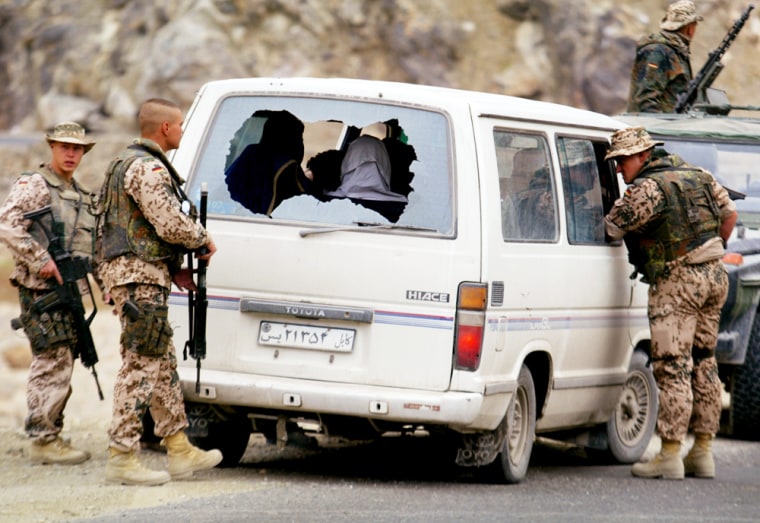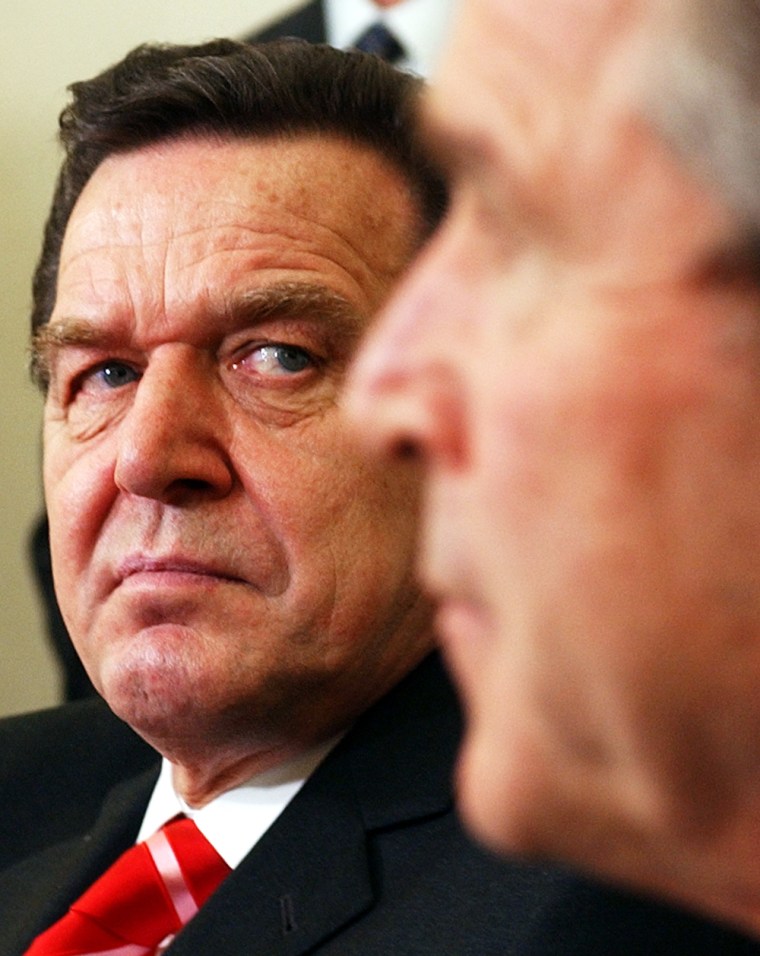Ever since Germany and some other European nations refused to support a U.S.-led military intervention into Iraq last year, a trans-Atlantic rift has been evident.
Relations between the United States and its long-time European allies are a little more cordial now, as demonstrated by the a meeting last month between President Bush and German Chancellor Gerhard Schroeder.
But the traditionally warm and cozy friendship — especially between Germany and the United States — is hard to detect these days.
And even in countries whose governments supported the war — such as Britain and the United Kingdom — public backing for the military campaign was far from robust.
The stings from U.S. Defense Secretary Donald Rumsfeld’s verbal attacks against Germany last year are still fresh. Derisively labeling Germany part of “Old Europe” and putting the country in line with rogue nations such as Libya and Cuba — as examples of other countries that were not supportive of the war — did not buy much American goodwill in Germany.
For the past year, Europeans have been waiting for an apology, but they have not gotten one yet.
When Rumsfeld was recently asked about the current state of U.S.-European relations and his “old Europe” remarks, he said the relationships were now “fairly normal.” Rumsfeld added that "he was too old to regret things he has said in the past.”
Germans have moved on and are hoping to start mending fences. "At present, bilateral talks between the two governments are mainly about reconciliation," said Klaus Proempers, a correspondent for German television ZDF.
"Most Germans do not expect Rumsfeld to be around much longer anyway, even if Bush wins the elections in November," Proempers said.
Belief that U.S. invasion was wrong
Today a majority of European Union citizens still believe that the U.S.-led invasion was wrong.
In a poll conducted by Germany's Allensbach Institute in January, 75 percent of respondents said that the U.S.-led mission was "unnecessary"; 72 percent said that they have a bad opinion of President Bush; and only 7 percent of respondents described their impression of Bush as "good.”
Analysts said it would be wrong to simply identify this notion as anti-Americanism.
"For the past 10 years, we have been seeing an emerging of different views and different approaches toward certain issues on both sides of the Atlantic," said Nicole Renvert, the director of the Future of Transatlantic Relationship Project at Germany's Bertelsmann Foundation.
"Even though the new European generation is very much influenced by the United States in everyday life, a general misunderstanding and new rhetoric is fueling certain stereotypes about the United States," she said.
As a result, Europeans’ faith in U.S. global leadership has been fading.
An opinion poll by the German Marshall Fund reflected that a clear majority of Europeans want the European Union to become a superpower like the United States.
But, they also want a stronger Europe to cooperate, rather than compete, with Washington.
This week's deadly attacks in Spain underlined the terror threat facing all nations, especially with the suspicion of an al-Qaida connection.
“The most devastating terror attack since Sept. 11, 2001, will change the consciousness of the people, and not only in Spain,” said Financial Times Deutschland on Friday.
In Italy, La Repubblica weighed in, noting that the fear of mass attacks was no longer the preserve of the Americans. “Whoever thought the American 'devils' were the only ones in the sights of Islamic terrorism was wrong. We are all in the same boat,” it said.
Foreign policy push
At the same time, Germany is promoting a more activist foreign policy these days.
Chancellor Schroeder has rejected sending military support to Iraq, but he is hoping his announcement that German police will begin training their Iraqi counterparts this month will be seen as a gesture of goodwill.
And despite the fact that France and Germany have repeatedly rejected committing any NATO troops to Iraq in even a peacekeeping role, Germany has sent troops in Afghanistan and cites that as an example of how it is a reliable and dedicated NATO member.

Germany actually plans to increase its contingent of 220 German soldiers, stationed in the northern Afghan city of Kunduz, as part of a so-called Provincial Reconstruction Team.
U.S. military officials in Europe praise the support that they have been given by local governments since their Iraq mission began, but hope that in the future European nations respond faster to new strategic visions.
"Germany has given a large amount of support, bent backwards by providing the necessary infrastructure for our missions and helping with base protection," Gen. Charles Wald, the deputy commander of the U.S. European Command, told NBC News.
"But now, a strategic shift, a shift of balance, a change of emphasis is needed, and the United States is not the only country that needs to be doing this," Wald said.
Military transformation
Military transformation, including the shifting of U.S. units from countries like Germany, Britain, and Italy to new facilities in Eastern Europe, is presently under way.
An adjustment process by European allies needs to follow inevitably, U.S. military officials said.
A number of military officials stressed that a positive effect of the dispute over Iraq is the public debate that has ensued, which can only help initiate future changes.
However, any future changes might be difficult to achieve in a Europe that is still far from united.
Many analysts argue that the EU is unable to offer world leadership when the fractious confederation gets bogged down in endless debate on so many issues. It leaves the United States on its own to make the big decisions.
